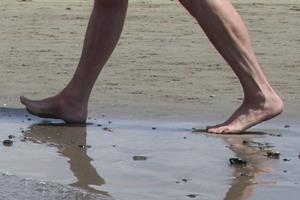Chiropractor, Wilmington NC: A Close Up On Plantar Fasciitis
Plantar fasciitis (pronounced “plan-tar fash-ee-EYE-tis”) is also sometimes referred to as a heel spur. It’s a debilitating and painful condition that can make walking even a short distance difficult. The discomfort—ranging from mild to severe—is typically most pronounced near the bottom of the heel, usually toward the front, though it may also extend across the entire bottom of the foot. Plantar Fasciitis is usually at its worst first thing in the morning after you get out of bed and walk a few steps, or when you stand up after sitting for an extended period. Our Chiropractor, Wilmington NC explains more.
What exactly is plantar fasciitis?
The plantar fascia is a thick band of very tough, fibrous tissue that extends from the heel bone to the base of the toes and supports the arch of the foot. When this ligament develops micro-tears, pulls away from the heel bone or becomes inflamed, pain and bone spurs can result. The muscles in the foot may also be involved, especially if the pain occurs after long periods of standing or from chronic overwork, which causes the muscles to shorten, making them less resilient and more susceptible to micro-trauma.
What causes plantar fasciitis?
Plantar fasciitis can occur for a wide variety of reasons and it’s frequently difficult to isolate any one specific cause. That said, here are some of the primary culprits:
- Standing for long periods of time
- Wearing shoes with little support
- Having flat feet
- Having exceptionally high arches
- Being overweight
- A sudden increase in activity
- Repetitive stress
- Tight calf muscles
- Overpronation (walking on the outsides of your feet)
- Aging
What can be done?
Unfortunately, recovery from plantar fasciitis usually takes time and is prone to setbacks. However, there are some things you can do to help ease the pain and speed the healing process.
Rest the foot as much as possible. Applying ice to the area can help reduce the inflammation, as can taking an anti-inflammatory such as ibuprofen. Many people with plantar fasciitis find it helpful to wear Birkenstocks or other shoes that have good arch support. Custom foot orthotics and heal cups can also provide some relief. At night, wearing a boot that gently stretches the plantar fascia, Achilles tendon and calf muscles (not allowing the foot and toes to point) can help reduce morning symptoms. If you work in an office environment, rolling a baseball or lacrosse ball beneath the arch of your foot while sitting at your desk can help achieve the same thing during the day.
In the long-run, it’s important to address the cause of the problem so that it doesn’t become chronic or recurring. Fortunately, your chiropractor can help in that regard. Chiropractic physicians are experts at treating a wide variety of musculoskeletal problems—not only those that affect the back and neck, but also those that affect the extremities. To treat plantar fasciitis, your chiropractor may use a combination of therapies, including manipulation/mobilization, stretching, cold laser, and ultrasound. He or she may also recommend custom orthotics and useful exercises that you can do at home to gently stretch tight muscles and tendons. Since one common cause of plantar fasciitis is overpronation, a series of chiropractic adjustments can ensure your bones are properly aligned, allowing for greater range of motion and helping to take some of the strain off the overworked muscles and connective tissues in your feet.
Healing plantar fasciitis is a slow process that may take weeks or months. However, with good chiropractic care, conscientious at-home treatment and proper shoes, it doesn’t have to become a chronic or recurring condition. Have any questions? Please call or visit our office today! We’re always happy to help!
To schedule a free consultation, contact our Chiropractor, Wilmington NC today.

